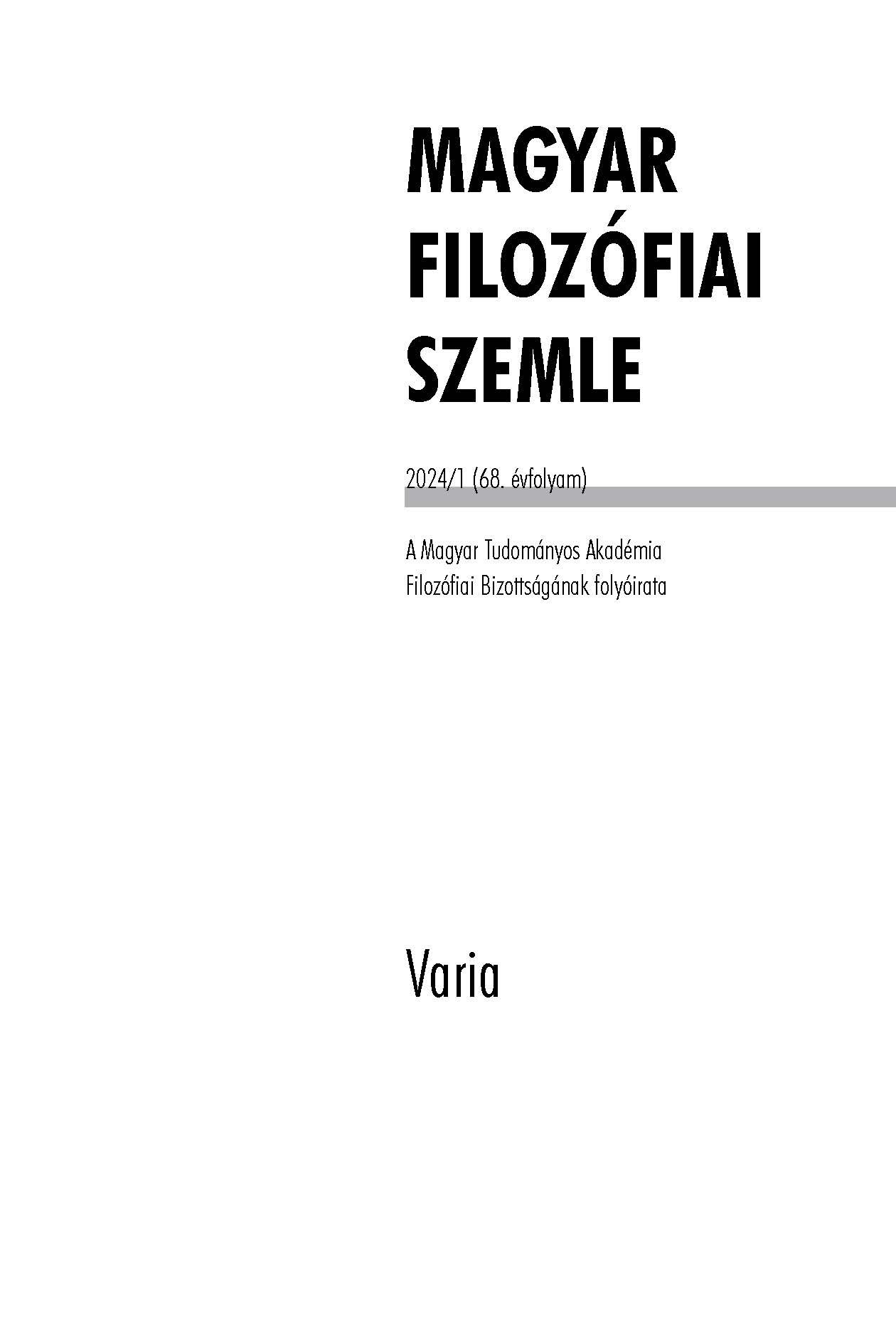Impersonal Reflections upon the Personal
Abstract
This piece of writing consists of brief thesis statements, each of which is followed by closer examination and interpretation, in order to enquire into the possibility of postulating impersonal, i.e. objective knowledge. As it appears nonsense to suggest the existence of knowledge without the holder (i.e. subject) of that knowledge, the correct point of departure for our investigation is not the question whether there is such a thing as objective knowledge; rather, we should focus on the potentials for disregarding the knowledge creator/ holder’s subjective personality. Several different aspects may be combined to define these potentials, which, following the arguments of various philosophical currents (e.g. scepticism, nominalism, post-empiricist philosophy of science, among others) that deny the possibility of subjective knowledge, also allow for the existence of an extreme, non-transferable form of solipsistic knowledge. Nevertheless, since such a form of knowledge is entirely useless, it is worth reversing the traditional approach: instead of starting with some putative objective knowledge (usually still stained with subjective elements) independent of the knowing subject, we should recognize that the various individualized bodies of knowledge can be connected along various dimensions, and this makes communication possible.
References
Barden, Garrett 1973. Reflexion of Time. The Human Context. 5/1. 331-343.
Dilthey, Wilhelm 2004. Gondolatok egy leíró és taglaló pszichológiáról. In uő: A történelmi világ felépítése a szellemtudományokban. Ford. Erdélyi Ágnes. Budapest, Gondolat. 167-255.
Eco, Umberto 2006. A nyitott mű poétikája. In uő: A nyitott mű. Ford. Dobolán Katalin. Budapest, Európa Kiadó. 24-59.
Fehér Márta 1983. A tudományfejlődés kérdőjelei. Budapest, Akadémiai Kiadó.
Fehér Márta 2002. Utószó. In Barry Barnes - David Bloor - John Henry: A tudományos tudás szociológiai elemzése. Ford. Faragó Péter és Tanács János. Budapest, Osiris. 294-310.
Foucault, Michel 1999. Mi a szerző? Ford. Erős Ferenc és Kicsák Lóránt. In uő: Nyelv a végtelenhez. Szerk. Sutyák Tibor. Latin Betűk, Debrecen. 119-145.
Gadamer, Hans-Georg 1984. Igazság és módszer. Ford. Bonyhai Gábor. Budapest, Gondolat.
Herskovits, Melville J. 1955. Cultural Anthropology. III/19. New York, Alfred A. Knopf. 348-367.
Kant, Immanuel 1783/1999. Prolegomena. Ford. John Éva és Tengelyi László. Budapest, Atlantisz.
Leach, Edmond 1966. Zwei Aufsätze über die symbolische Darstellung der Zeit. In Kulturantropologie. Szerk. W. E Mühlmann - E. W. Müller. Köln, Kiepenheuer & Witsch. 392-408.
Lejeune, Philippe 2003. Gide és az önéletrajzi tér. Ford. Bárdos Zsuzsanna. In uő: Önéletírás, élettörténet, napló. Budapest, L'Harmattan. 47-75.
Lejeune, Philippe 2009. On Diary. Ford. Katherine Durnin. University of Hawai'i Press.
Lejeune, Philippe 2009a. The Practice of the Private Journal: Chronicle of an Investigation. In Lejeune 2009. 29-48.
Lejeune, Philippe 2009b. The Diaryas "Antifiction". In Lejeune 2009. 201-210. https://doi.org/10.1007/978-2-8178-0157-5_9
Lurija, Alekszandr Romanovics 1987. Utam a lélekhez. Ford. Pléh Csaba. Budapest, Gondolat Kiadó.
Márkus György 1992. Miért nincs hermeneutikája a természettudományoknak? Ford. Mezei György. In uő: Kultúra és modernitás. Budapest, T-Twins Kiadó - Lukács Archívum. 273-355.
Marx, Karl - Engels, Friedrich 1845/1974. A német ideológia. Ford. Kislégi Nagy Dénes. Budapest, Magyar Helikon.
Marx, Karl 1845/1974a. Tézisek Feuerbachról. In Marx - Engels 1845/1974. 7-11.
Nietzsche, Friedrich 1873/1992. A nem-morálisan fölfogott igazságról és hazugságról. Ford. Tatár Sándor. Athenaeum. I/3. 3-15.
Platón 2001. Theaitétosz. Ford. Bárány István. Budapest, Atlantisz.
Rickert Henrik 1923. Kultúrtudomány és természettudomány. Ford. Posch Árpád. Budapest, Franklin-Társulat.
Searle, John R. 2000. Elme, nyelv és társadalom. Ford. Kertész Balázs. Budapest, Vince.
Sextus Empiricus 1998. A pürrhonizmus alapvonalai. In Antik szkepticizmus. Szerk. Kendeffy Gábor. Budapest, Atlantisz. 171-373.
Sümegi István 2016. Mit jelent kérdezni? Kőszeg-Szombathely, Savaria University Press.
Sümegi István 2016a. Ingovány. In Sümegi 2016. 133-153.
Sümegi István 2016b. A humaniora alkonya. In Sümegi 2016. 9-83.



